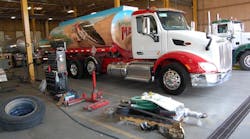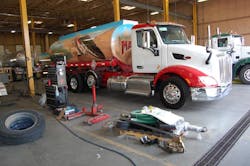Over the last few weeks, I’ve heard a number of interesting comments regarding the need for the transportation and logistics industry to change the way it operates when it comes to recruiting, managing and retaining its workforce — a theme that goes double for trucking.
[But first let me digress for a moment in honor of St. Patrick, the Patron Saint of Ireland, as many of the previous posts in this space honoring him on this, his day, centered on the character of the good folks piloting commercial vehicles on our roadways day-in and day-out.]
Now of course, that means discussing the oft-derided Millennial generation — a generation many claim lacks a work ethic and is emotionally brittle and spoiled, with many poorly-educated and specifically lacking vocational skills.
Yet George Arrants, director of training and recruitment for the WheelTime Network, stressed during a panel discussion at the 2016 Technology & Maintenance Council (TMC) annual meeting that if you want to know why Millennials are so problematic, go look in the mirror.
“We created this generation and we expect them to understand the way we think,” he said. “What we need to do is understand the way they think.”Interestingly, Arrants explained that Millennials, by and large, are not driven by the amount of money they make. Based on his experience recruiting technicians, he said they need to “feel like part of a family” and feel needed.
“They are actually very productive; tell them what needs to be done and they’ll do it,” he added. “They don’t have a problem with the rules; largely it’s enforcement of the rules. For example, the consequences of breaking the rules must be equally applied, or they're simply done with them.”
Yet Arrants also stresses there is a vast disconnect in the “life skills” Millennials were taught in school versus the needs of the workplace.
“In today’s educational model, absences and tardiness are acceptable. In my work world, you are absent two times, you are fired,” he emphasized. “You have to be at work on time every day. If you are not there or late 10% of the time, that’s 10% of the work not getting done. So if they can’t show up on time, we can’t use them. That’s why I say to employers, don’t look at [a candidate’s] GPA [grade point average] but look at their attendance record. We can’t do anything unless they know how to work.”
That being said, other aspects of the Millennial generation could provide recruitment opportunities for the freight industry — if they are tapped in the right way, argues Erik Malin, formerly with consulting firm Carrier Direct.
“The Millennial population values mentoring and coaching,” he explained in a recent conference call hosted by Stifel Financial Corp. “They don’t want a boss; they want guidance, not direction. But most importantly, they want the opportunity for personal growth, which comes with an emphasis on better work-life balance.”
While many in trucking are probably rolling their eyes at all of this right now, here’s an aspect of Millennial wants-and-needs that might be surprising: Some 64% would rather make $40,000 a year at a job they love than $100,000 a year at a job they feel is boring.
“In essence that means they’ll pay you $60,000 for an interesting job and one they feel offers value,” Malin explained, offering up some other generational tidbits along those lines:
- Some 56% of Millennials will not work at a company that bans social media access.
- Over 65% of Millennials value opportunity for personal growth as a primary factor in selecting employment.
- Only 21% of Millennials view starting salary as a major factor in selecting an employer.
Still, this doesn’t mean recruiting truck drivers is suddenly going to get any easier if motor carriers begin to deploy “mentoring” strategies, for the industry will continue to struggle uphill due to a variety of factors — not the least of which being negative perceptions of transportation and logistics work generated by the parents of Millennials.
“The problem starts around the dinner table,” noted Dave Williams, a former fleet director with Verizon, during the TMC panel discussion. “Parents expect their kids will go to college.”
John Larkin, managing director and head of transportation capital markets research for Stifel, noted how that “background noise,” if you will, is hampering the trucking industry’s ability to fill seats — despite significant jumps in driver pay over the last two years.“The labor shortage [in transportation and logistics] is no more apparent than it is in the truck driver space as the gap between average pay and truck driver pay has continued to widen over time,” he explained last summer during a presentation at the University of Denver Intermodal Transportation Institute.
“Just in the last year or so, trucking companies have taken driver pay up 10% to 20% to try and close this gap. What they’re finding is that it’s still not having much of an impact on reducing the so-called driver shortage,” he said.
“Even though our economy is growing at a relatively slow clip, what we’re finding is that some of the Millennials have a little different set of priorities in terms of what they want to be doing with their 24 hours each day,” Larkin stressed. “Sleeping in the sleeper part of a Class 8 tractor is probably not high on their list; showering at a truck stop is probably not high on their list either.”
Then there are all the rules truck drivers must follow. “Being told how fast to drive, which route to take, where to take your rest, where to fuel, how much fuel to take on at that fuel stop, and when to deliver the freight within that 15 minute window is probably not high on their list either,” he pointed out.
That’s why Larkin believes pay is almost "a non-issue" in many cases, as trucking companies paying $70,000 to $80,000 per year find themselves still struggling to locate “good, drug-free people” who are willing to operate according to the rules.
Yet find them the industry must, stressed Malin. “With 75% of the workforce to consist of Millennials by 2025, the bottom line is we have to adapt to them because they will be the majority,” he said.
It will be interesting to see how the industry comes up with a new people perspective to address such issues.





